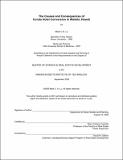| dc.contributor.advisor | Brian Anthony Ciochetti. | en_US |
| dc.contributor.author | Lu, Mark C. K | en_US |
| dc.contributor.other | Massachusetts Institute of Technology. Dept. of Urban Studies and Planning. | en_US |
| dc.coverage.spatial | n-us-hi | en_US |
| dc.date.accessioned | 2006-06-20T12:54:10Z | |
| dc.date.available | 2006-06-20T12:54:10Z | |
| dc.date.copyright | 2005 | en_US |
| dc.date.issued | 2005 | en_US |
| dc.identifier.uri | http://hdl.handle.net/1721.1/33180 | |
| dc.description | Thesis (S.M.)--Massachusetts Institute of Technology, Dept. of Urban Studies and Planning, 2005. | en_US |
| dc.description | This electronic version was submitted by the student author. The certified thesis is available in the Institute Archives and Special Collections. | en_US |
| dc.description | Includes bibliographical references (p. 98-102). | en_US |
| dc.description.abstract | This paper explores the causes and consequences of the recent conversions of hotels into 'condo hotels' in Waikiki, Hawaii, through an examination of local and national real estate trends. Condo hotels result from the conversion of hotels to individual condominium units operated as a hotel. In the last few years forces driving a national residential real estate boom have carried the concept of the condo hotel to the forefront of the public's imagination. For developers, the model of hotel conversion offers numerous advantages and has proven an effective bridge between risk adverse lenders and developers seeking project financing. Developers and condominium buyers alike value the services and branding hotel operations can bring to a property. In Waikiki, condo hotels operate as a vehicle for the renovation and reinvention of aging hotel stock. The product has proven exceptionally popular, yet the wholesale conversion of aging hotel stock could have both positive and negative consequences for Waikiki or similar communities. While condo hotels can upgrade a region's accommodations infrastructure, some allege it has the potential to disrupt local employment and undermine tax revenues. Others fear demographic changes and social displacement not unlike the controversy over apartment conversions in the 1970s. | en_US |
| dc.description.abstract | (cont.) No doubt conversion of large numbers of hotels into condo hotels will result in change but that change needn't produce a negative outcome. | en_US |
| dc.description.statementofresponsibility | by Mark C.K. Lu. | en_US |
| dc.format.extent | 102 p. | en_US |
| dc.format.extent | 1289037 bytes | |
| dc.format.extent | 1298026 bytes | |
| dc.format.mimetype | application/pdf | |
| dc.format.mimetype | application/pdf | |
| dc.language.iso | eng | en_US |
| dc.publisher | Massachusetts Institute of Technology | en_US |
| dc.rights | M.I.T. theses are protected by copyright. They may be viewed from this source for any purpose, but reproduction or distribution in any format is prohibited without written permission. See provided URL for inquiries about permission. | en_US |
| dc.rights.uri | http://dspace.mit.edu/handle/1721.1/7582 | |
| dc.subject | Urban Studies and Planning. | en_US |
| dc.title | The causes and consequences of condo hotel conversion in Waikiki, Hawaii | en_US |
| dc.type | Thesis | en_US |
| dc.description.degree | S.M. | en_US |
| dc.contributor.department | Massachusetts Institute of Technology. Department of Urban Studies and Planning | |
| dc.identifier.oclc | 65469139 | en_US |
